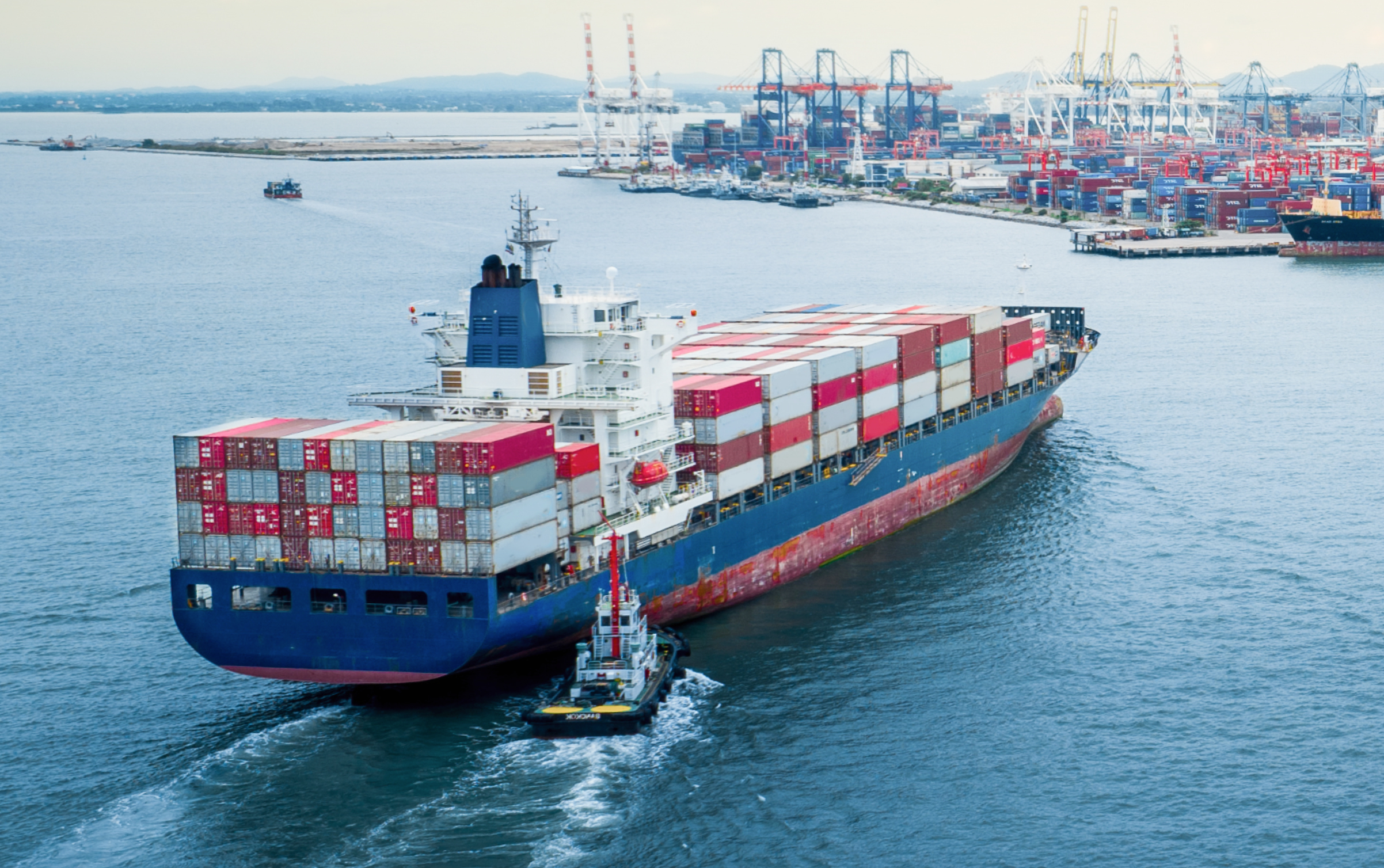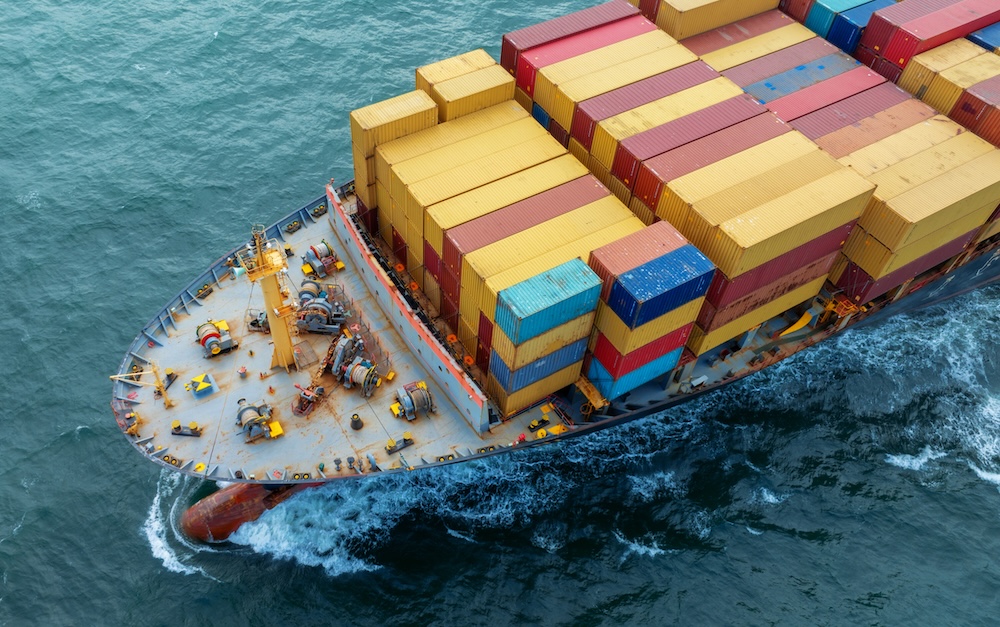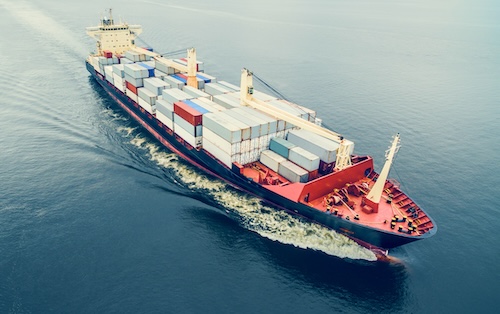Navigating Customs and Regulations for SCL Shipments
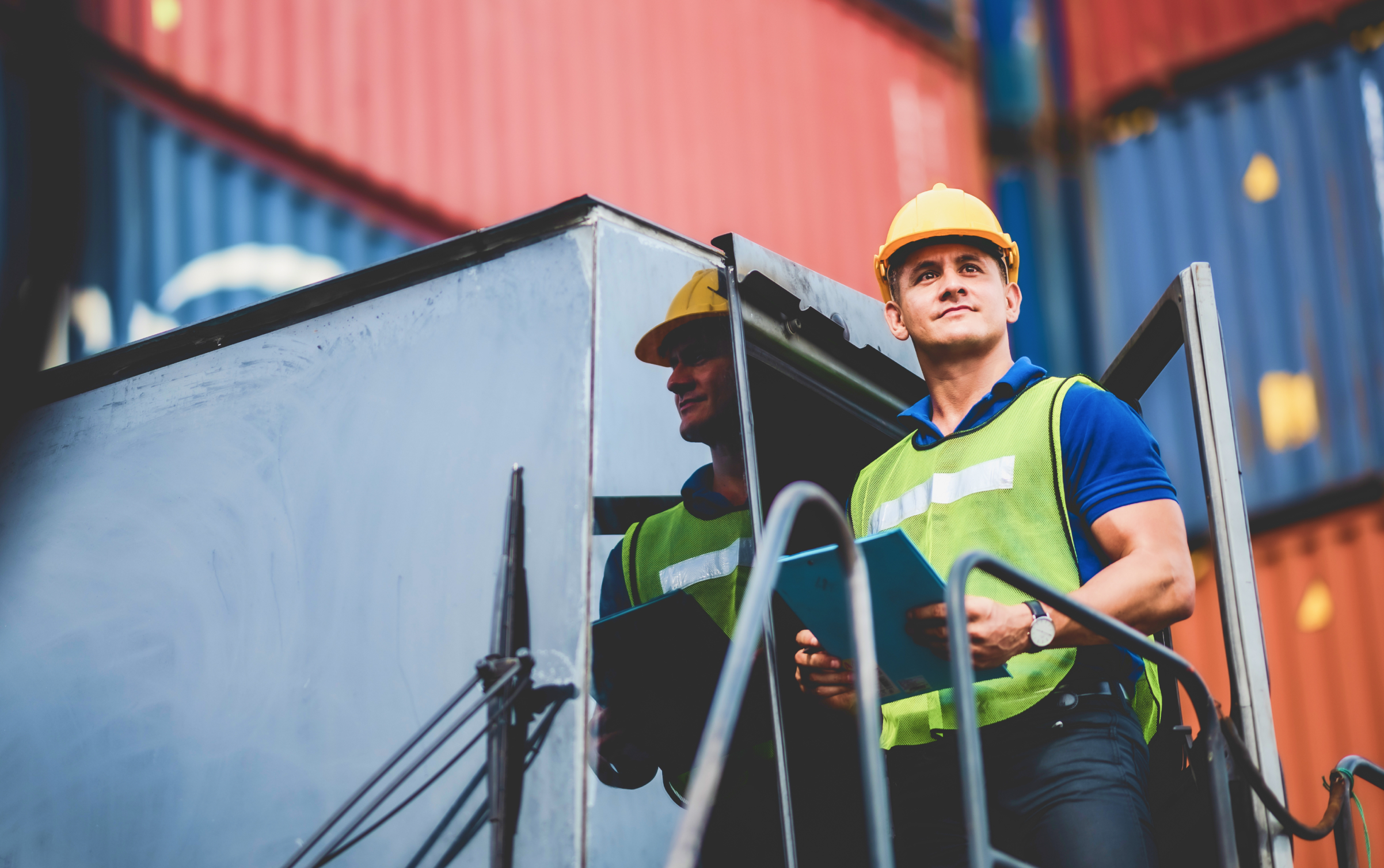
International shipping operations come with regulatory complexities that can be difficult to navigate. These are popularly referred to as customs and regulations, and how you navigate them can drastically impact the operation's success, whether it is for LCL, FCL, or SCL shipments. However, it is important to note that these regulations were not set up to make shipping difficult. Rather, they were set up to ensure every stakeholder could operate in a way that enhanced the overall operation's success.
Understanding and adhering to these regulations should reassure stakeholders, especially shippers, of the confidence and stability of the shipping industry. However, the complexity of the regulations will differ according to the nature of the shipping service. For instance, SCL shipments will attract more regulatory scrutiny than an FCL shipment. And naturally, an LCL shipment will attract much more than the SCL shipment because of the number of shippers leveraging it.
This article explores key customs considerations for SCL shipments and what shippers can do to ensure a smooth SCL shipping process.
Key Customs Considerations of SCL Shipments
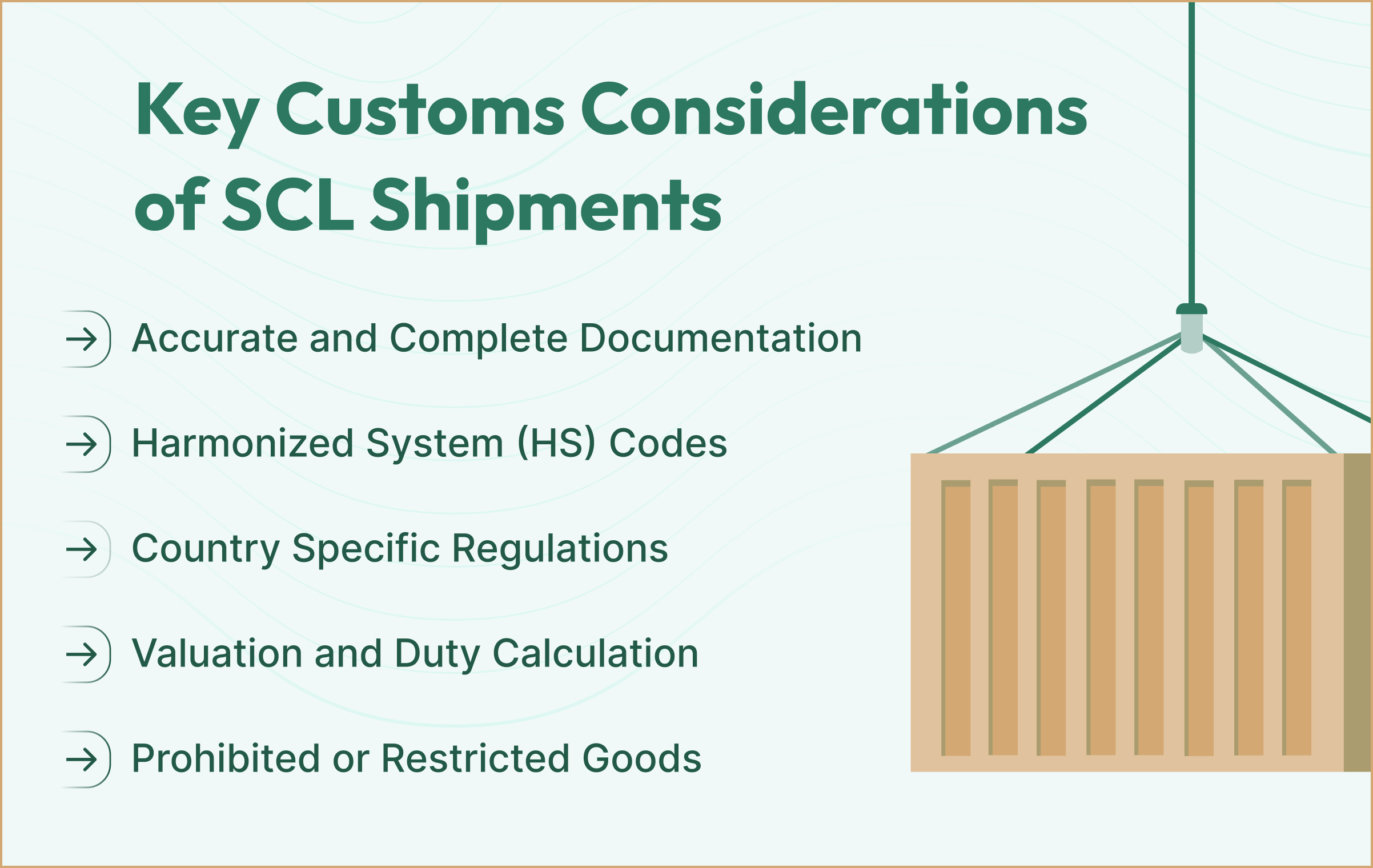
Although regulations were established to ensure the smooth running of shipping operations and the facilities enhancing them, they are also established to control what enters and leaves countries of origin and destination. The key considerations from these regulations regarding the SCL shipping process are of note.
1. Accurate and Complete Documentation
Bringing or taking goods out of a country will naturally warrant many questions from different departments or regulatory bodies, chief of which are the customs. However, it will take forever to probe and investigate each shipment, which is why documentation is critical to the process. It tells the story of the shipment, telling the authorities the origin, transactional history, destination, specific ports of shipping, and suitability of the goods to come in or leave the country.
Without these, your entire shipping operation will be in trouble, attracting penalties, goods seizure, and other legal attention that can be quite uncomfortable. The common shipping documents you can expect are commercial invoices, packing lists, bills of lading, and certificates of origin. Others may be required depending on the destination and nature of the shipment.
2. Harmonized System (HS) Codes
HS codes are six-digit product classification codes that allow for standardization worldwide. The World Customs Organization created them to ensure harmony and one reference source for all shipping needs. Understanding the HS Codes will help prepare documentation and set up the entire shipping process.
3. Country Specific Regulations
Despite the relevance and importance of the HS codes, each country has its own rules that guide its shipping operations. Taking an SCL cargo that is not permitted into the country could attract legal attention. Sometimes, the quantity might be too much. Then there is the language, which is also important. Ensure documentation is prepared in a language acceptable to the destination country to avoid delays.
4. Valuation and Duty Calculation
Valuation of SCL shipments is important because it helps calculate the due customs duties and taxes, which are essential aspects of the shipping operation. The customs calculate the value of duty of taxes on the goods using various methods such as transaction, computed, and deductive values, among others. It is important to ensure accuracy when reporting the value of the goods because wrong information can attract penalties. In cases where the cargo has been overvalued, it could lead to excess cost, potential financial loss from the operation.
5. Prohibited or Restricted Goods
Always ensure you aren’t shipping in or out restricted goods from the host country or port. These goods or illegal substances are restricted for various reasons and could lead to suspicion of criminal activities when discovered. To ensure you are on the right side of the law, partner with a broker or freight forwarder to help. You could also explore shipping guidelines for the country of choice.
Best Practices For Smooth Customs Clearance of SCL Shipments

Navigating customs and regulations can be quite complex, presenting potential challenges for stakeholders, especially shippers. However, with the right knowledge, it doesn’t have to be so challenging. Here is our guide or best practices for smooth clearance during shared container load (SCL) shipping.
1. Leverage The Expertise of a Freight Forwarder or Customs Broker
Before embarking on any shipping service, whether SCL, less than container load (LCL), or full container load (FCL) shipping, it is always important to leverage the services of a knowledgeable freight forwarder or customs broker. They are experts in the shipping industry and can help with documentation, finding carriers, consolidating, and expediting the entire process.
However, it is important to do your due diligence when searching for and partnering with these businesses. For example, expertise, experience, and technology adaptation or integration should always be considered in a freight forwarding business. It will go a long way to streamlining workflows and the shipping experience.
2. Pre-Shipment Planning and Communication
Like the less-than-container load (LCL) shipping service, SCL shipments must be consolidated. When planning to involve other parties, making relevant provisions, prior notice and communicating effectively are non-negotiable. When working with the freight forwarding business, they will be instrumental in finding shared container load partners on time and ensuring minimal delays.
Beyond finding an SCL partner to maximize the container space, there is the issue of finding and booking spaces before it turns into a bidding war, which can get too expensive. SCL shipping is usually done through a spot contract or pricing. However, spot contracts are so volatile that poor planning will usually put the shipping operation on the high side financially.
3. Utilizing Technology and Automation
Technology is a big part of supply chain management, which entails shipping. It will be critical to ensure there are no errors in documentation during the shipping experience, but it can also be leveraged to track shipments across the ocean. With digital freight forwarders like Silq, you can customize workflows seamlessly.
Automating the process is also a great way to ensure a seamless customs experience. This includes ensuring the shipments are in order and following all the relevant regulations and rules between both countries, as well as boosting safety and mitigating risks associated with the shipping operation.
4. Maintaining Good Records
Following the OSRA 2022 ruling, it is in the stakeholders' best interest to maintain impeccable records of all shipping activities, as they may need to defend them at any time. The recommended records are up to five years' worth of shipping activities, but they will help ensure that whenever a clarification demand is made on the SCL shipment at any point, the business can simply provide them without much hassle.
5. Staying Informed and Adapting
The shipping industry is constantly changing, but information is how businesses and other shipping stakeholders stay ahead of the curve. To do this successfully, you may consider subscribing to market-leading newsletters, attending industry conferences, and making new connections across the industry.
From Frustration to Smooth Sailing of SCL Shipments
When a handcrafted furniture business started importing materials for its products, it was excited about the potential but quickly became overwhelmed by the maze of customs regulations plaguing the logistics process. Mismatched HS codes, incomplete paperwork, and unexpected delays became a constant headache.
The company knew it was spending more time deciphering international transportation rules than running the business, and this trend continued until the leadership discovered Silq. The digital freight forwarding platform's proactive approach to customs compliance caught their eye.
Right from the start, Silq assigned a dedicated expert who walked the company through the necessary documentation, ensuring every detail was accurate and complete. Silq also helped us identify the correct HS codes and how to value and document the company's unique products, preventing any classification issues at customs.
Now, the same furniture company is shipping more frequently and confidently. It no longer fears customs audits during Import or export because its supply chain can ship SCL shipments seamlessly thanks to Silq's organized digital platform.
Navigating SCL Shipments Through Customs and Regulations With Silq
SCL and LCL transport services, unlike FCL shipping, usually attract a lot of attention because of their nature. This added attention means that getting the entire shipping process right—from documentation to tracking containers, cargo handling, and navigating the authorities—is necessary. That is why you need a freight forwarding partner like Silq.
Silq is a digital freight forwarding platform that leverages expertise, experience, and technology to ensure the entire SCL shipping operation goes smoothly. We are especially well-versed in ensuring our customers can navigate customs and regulations seamlessly. With us, you may never have a better shipping experience. Get Started.
Ready for Supply Chain Predictability?
Importers using Silq ship smarter, safer, and with total control.



